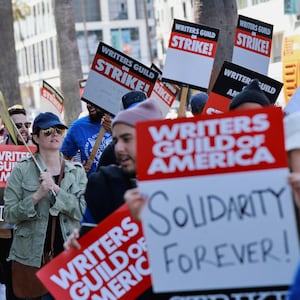This is a preview of our pop culture newsletter The Daily Beast’s Obsessed, written by editor Kevin Fallon. To receive the full newsletter in your inbox each week, sign up for it here.
On June 19, 2009, Pushing Daisies was taken away from me. Its final episode aired that night, after two seasons.
The series was colorful, inventive, and funny, and it had a touching fascination with death. (In the case of this show, I mean quite literally “touching.”) It featured Kristin Chenoweth singing “Hopelessly Devoted to You” from Grease in a pie shop. It gave us Tall Boy Extraordinaire Lee Pace in a major role, before he was in blockbuster movies.
For anyone to deprive the world of all that wonderfulness points to how extreme circumstances must get to necessitate a writer’s strike, which shut down production of Pushing Daisies’ fantastic first season and, in part, was responsible for a downturn in ratings when it returned for Season 2. (There’s a more nuanced take about how the 2007-8 Writers Guild of America strike affected Pushing Daisies and other programs in this thread here.)
Pushing Daisies has been top of mind these last few days, as the WGA strikes for the first time since 2008. The work stoppage started Monday, after breakdowns in contract renegotiations with studios over wages, staffing issues, residuals, health insurance, and—let’s face it—just-plain fairness and decency. (You can read a more detailed explainer here.)
There is already an onslaught of news about how the strike is affecting TV production: planned Saturday Night Live episodes hosted by Pete Davidson, Kieran Culkin, and Jennifer Coolidge have been scrapped, while Drew Barrymore has stepped down as host of the MTV Movie & TV Awards in solidarity with the writers. (More links! Here’s a rundown of how the strike will affect your favorite shows.)
But you know what is also news? How not striking would have affected humans, the writers on the picket lines who are fighting for a seismic, though necessary change in their industry.

This strike is happening at the same time as I’m seeing colleagues, friends, and people whose work I’m simply a fan of announcing, almost every day, that they’ve been laid off from their jobs at major media organizations—the places you and I read every day. I see just how many WGA members and industry allies are picketing, because despite working for majorly profitable companies, they can’t afford to, in some cases, live.
It all just feels…so…not great, as if each morning I, and so many other writers I know, am playing Russian Roulette with a trap door. Every day, the lever is pulled, and we know that, at some point, it’s going to open. It feels like there’s a certainty of it, that it’s inevitably going to happen. What we don’t know is how far we’re going to fall, or if we’ll ever land somewhere.
Why should you care that I, or anyone, write for a living—and can actually make it a livelihood? I’ve thought about this a lot, in attempting to figure out how to explain to people why they should care about this WGA strike. It’s not just because the next season of Abbott Elementary might be shortened, or that my imaginary husband Seth Meyers won’t be on TV every night. (Though these are two scenarios that, in my life, at least, are positively devastating! )
The question I keep asking myself is: How do I explain to people that writing matters, without sounding like a person who of course would say that—because he’s a writer?
The work people do has worth, is the simplest answer. Being taken advantage of is sinister. When it’s being done at the expense of our leisure and enjoyment, we should be furious on those people’s behalf. (However someone might feel about Hollywood’s reputation, the fact is that we rely upon it for our leisure and enjoyment.)
We should defend writers. I have observed in my incredibly short, admirably youthful life that the wealth disparity in creative fields is, in a word, obscene. The barrier to entry is ridiculous. Talented people are forced out because their work is demeaned as “just writing,” and the burnout, combined with the low wages, makes whatever calling they felt to this career no longer seem worth it.
There’s a story that went viral this week about a writer for The Bear. For him, it was a dream job. That is, except for the fact that he often couldn’t write scripts for the show from his apartment, because he couldn’t afford heat, and he had such little money in his bank account when his work won a WGA Award that he had to purchase the bowtie he wore to the event on credit.
I think this story was shared so much because it exemplifies what we forget, and that the suits on the other side of the WGA bargaining table seem blind to: These people are humans. (Sorry to the AI community.) We pay rent. We need healthcare. We stress about finances. And we have dreams.
Writing is, in many ways, the act of dreaming. How ridiculous it is to be told, time again, with every round of media layoffs, and with every broken negotiation that results in a strike, to stop dreaming and settle. It’s the antithesis of what this job is about.

Writers aren’t heart surgeons, sure. But they are heart massagers. Or heart ticklers. (Depends on the show or, in my case, the article, I guess.) Obviously we are not building houses or laying pavement or working as doctors. (Though we do widely circulate our Ozempic connections.) But we are people who have a skill, one that we studied. It’s a skill that was nurtured, and that people told us has value in this world.
A person could say that the simple act of capturing another person’s interest is the value of writing; a person could also say that some of the words that we write and the stories we tell can and do open minds and, in some cases, save lives. I would say both things are true.
Writing is an act of narcissism, but it is also one of generosity. We can be compassionate egoists—we’re a complex people. It is still outrageous for me, or most writers, to think that anyone who’s reading a story that I’ve written cares what I have to say. But the act is also, and I am sure many writers feel this way too, something I think of as a responsibility. This is my profession, and it is a duty. (Also, obligation shouldn’t negate compensation.)
It is painful to break open your heart and let it bleed on a page, but the hope is that it heals you and maybe someone else that sees the words. It is important to spotlight the experiences of the marginalized and the slighted. It is imperative to make people laugh. The requirement, always, is to write the truth—as gratifying or as uncomfortable or as silly as that may be.
I can write about my struggle to come out, battling cancer, or the extreme grief I experienced during the pandemic—or I can write thousands of words in ode to Kristin Chenoweth being fabulous. Or even, like, a fart joke. I consider all of it work. Work that other people would enjoy. And as such, work that should receive a paycheck.
In the short term, there are things you will notice as a result of this strike, like TV series you like taking longer to return to air, and the futures of many projects will suddenly become precarious—like what happened to my beloved Pushing Daisies. In principle, there are other things that you should be concerned about: Treating TV writers as replaceable freelancers, or dispensable entirely, makes the TV you like bad. And when it comes to the media, I assume you like reading the news. I’m not sure how the news—the actual news—is going to exist if layoffs, shutdowns, and reductions continue at this rate.
Why should you care about writers? Because people matter. And the thing about writing is, we’re not just writing about or for ourselves. It’s all about and for you, too. And I just have a hunch, but I expect that you believe you just might matter.
Keep obsessing! Sign up for the Daily Beast’s Obsessed newsletter and follow us on Facebook, Twitter, Instagram and TikTok.









